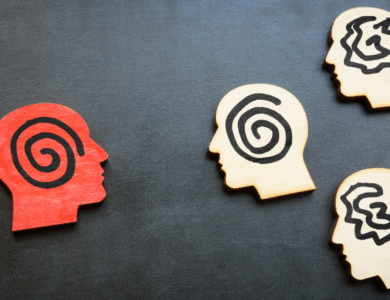
A calm and secure space combined with controlled eye movements is where healing with EMDR therapy often begins. More than just a clinical technique, Eye Movement Desensitization and Reprocessing (EMDR) therapy provides a path for unprocessed pain to find release. Individuals seeking an EMDR therapist are often burdened by painful memories, overwhelming sorrow, or feelings of emptiness that take away the desire to engage in everyday life. Through desensitization and reprocessing, this therapeutic approach helps soften the sharp edges of the past, making it easier to move forward with greater clarity and peace of mind.
This approach has been very helpful for individuals facing PTSD, depression, and anxiety to just make it easier for them to be able to deal with difficult feelings and then move forward. But we can ask, how can the EMDR treat PTSD and beyond, and change the process of healing?
Healing Beyond Talk: Why EMDR Therapy Matters
Traditional conversations in therapy often open doors to understanding, yet many traumatic experiences resist words alone. Certain traumatic events remain frozen, causing distress long after they pass. That’s why the desensitization of eye movements and processing can bring new light. A guided bilateral stimulation program helps the brain to revisit these memories. Not to revisit the past, but rather to make them more secure.
The demand for anxiety and trauma therapy has been increasing in Canada. Growing awareness of mental health services emphasizes the necessity for treatments, which ease the body’s reaction and overwhelmed minds.
The EMDR method has been identified as an option that can be beneficial for illnesses such as post-traumatic stress disorder (PTSD) and generalized anxiety disorder as well as major depressive disorder.
Every step of therapy helps to promote equilibrium and assists people who have their lives disrupted because of symptoms of anxiety or depression. In many ways, this approach reshapes the meaning of recovery.
How EMDR Therapy Works: The Science of Reprocessing
Memory stored following traumatizing events are often buried in your brain’s system of alarm. These memories are reactivated in flashbacks, nightmares, or even emotional triggers.
The process of desensitization and reprocessing involves defined phases that allow clients to focus on thoughts that are troubling them while making the eye’s movements from side to side. The process eventually lets the brain store the memories in a healthier manner.
Unlike standard conversations in therapy, EMDR does not require retelling every painful detail. Instead, the treatment focuses on the way in which memories are held in the brain. Under the supervision of a professional in mental health, the majority of clients report less anxiety and a greater sense of stabilization after numerous sessions.

EMDR Therapy for PTSD: A Path Through Trauma
Post-traumatic stress disorder may change the routine life. Flashbacks, hypervigilance, and avoidance habits disrupt the rest of your life relationships. People seeking trauma therapy near me discover EMDR as a recommended approach for PTSD.
In sessions, the painful memory is slowly revisited, and reprocessing lessens the weight it holds. In time, it becomes less threatening and loses its grip in the current. The patient is able to regain faith in the safety of their own mental power. The effectiveness of EMDR therapy in treating PTSD is well-known among the most sought-after treatment options for those suffering from unresolved trauma.
Addressing Anxiety Through EMDR
Instant worry, nervousness, and anxiety are all signs of generalized anxiety disorder. In these cases, the traditional methods of coping may not be able to control the body’s alarm reactions. Anxiety and trauma counseling through EMDR helps by lowering the intensity of stored fear responses.
When anxious patterns are linked to earlier traumatic experiences, EMDR sessions target those root memories. This reduces the need for constant hyper-alertness. The therapy assists in breaking cycles of worry and allows the nervous system to relax. As a result, individuals often notice improved concentration, calmer moods, and restored daily function.
EMDR Therapy and Depression
Depression and anxiety are often inseparable which can cause distress. It is a technique to manage the unresolved traumas that accompany major depression. A lot of people who suffer from feeling of despair, sadness, and lack of motivation realize that their emotions have a connection to previous pain.
Through focusing on those particular memory triggers, EMDR promotes shifts in the way they are viewed. It helps to replace negative thoughts with more positive ones. In some cases, it is a relief with a gradual return of energy and life starts to be manageable. Although it isn’t a panacea of all mental illnesses, EMDR offers a supportive option for those who are suffering from signs of depression that stem from trauma.
The Role of a Skilled EMDR Therapist
The efficiency of EMDR is dependent upon the presence of a qualified EMDR therapist. A positive and supportive atmosphere created by a mental health specialist is crucial to ensure security and advancement. When searching for an EMDR therapist near me, clients are encouraged to seek practitioners with proper certification in eye movement therapy.
Sessions are not rushed. The therapist will ensure that the patient is ready, helping through the stages of preparation, reprocessing, and finally closure. Professional guidance helps prevent retraumatization and increases confidence throughout the healing process. The presence of a caring therapist could alter the way recovery is carried out.
Why People in Canada Turn Toward EMDR
The increasing demand for trauma therapy near me is a sign of shift toward more holistic approaches for mental health. A better understanding of the effect trauma can have in the development of certain conditions like post-traumatic stress disorder or generalized anxiety disorder, drives the search for efficient treatments.
Private practices, community clinics, as well as mental health clinics, provide EMDR in addition to other support. A lot of people realize that recovering from traumatic stress disorder takes more than coping; it demands reprocessing. EMDR’s structured framework has become a valued part of the growing mental health landscape in Canada.
Final Thought
The process of recovering from trauma, anxiety or depression can be as a stressful, tense feeling. Memory can’t be erased. But, they may change into memories that don’t have control over the present.
If you are looking for EMDR therapy for PTSD, Anxiety, or Depression, the choice is often a pivotal moment. The process of recovery takes time. However, every session offers the chance of peace in a place where there was anxiety. With the help of a trained professional, the way forward is one of resiliency and faith.




